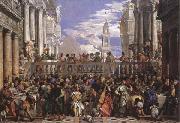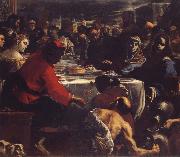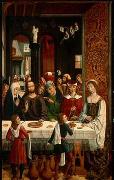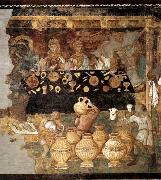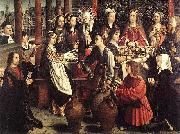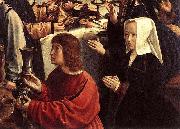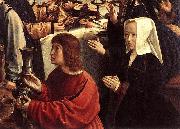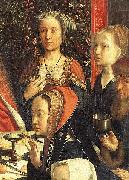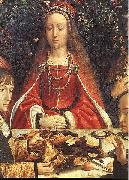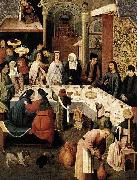Wholesale Oil Painting No Minimum |
|||||||||||
|
|
|||||||||||

|
|||||||||||
|
|
|
||||||||
Paolo VeroneseItalian Mannerist Painter, ca.1528-1588 Italian painter and draughtsman. With Titian and Tintoretto he makes up the triumvirate of great painters of the late Renaissance in Venice. He is known as a supreme colourist and for his illusionistic decorations in both fresco and oil. His large paintings of biblical feasts executed for the refectories of monasteries in Venice and Verona are especially celebrated. He also produced many altarpieces, history and mythological paintings and portraits. His compositional sketches in pen, ink and wash, figure studies in chalk, and chiaroscuro modelli and ricordi form a significant body of drawings. |
||||||||
|
|
||||||||
The Marriage at Cana
The Marriage at Cana Painting ID:: 26750 |
Oil on canvas
6.7x9.9cm
Louvre,Paris
Oil on canvas 6.7x9.9cm Louvre,Paris |
|||||||
|
|
||||||||
Mattia Preti1613-1699 Italian Mattia Preti Gallery Born in the small town of Taverna in Calabria, Preti was sometimes called Il Cavalier Calabrese (the Knight of Calabria). His early apprenticeship is said to have been with the "Caravaggist" Giovanni Battista Caracciolo, which may account for his life-long interest in the style of Caravaggio. Probably before 1630, Preti joined his brother Gregorio (also a painter), in Rome, where he became familiar with the techniques of Caravaggio and his school as well as with the work of Guercino, Rubens, Reni, Giovanni Lanfranco. In Rome, he painted fresco cycles in Sant'Andrea della Valle and San Carlo ai Catinari. Between 1644 and 1646, he may have spent time in Venice, but remained based in Rome until 1653, returning later in 1660-61. He painted frescoes for the church of San Biago at Modena (app. 1651-2) and participated in the fresco decoration of the Palazzo Pamphilj in Valmontone (documented 1660-61), where he worked along with Pier Francesco Mola, Gaspar Dughet, Francesco Cozza, Giovanni Battista Tassi (il Cortonese), and Guglielmo Cortese. Jacob blessing his grandchildren, Ephraim and Manasseh, in the presence Joseph and their mother Asenath. Whitfield Fine Art Gallery, London.During most of 1653-1660, he worked in Naples, where he was influenced by the other major Neapolitan painter of his era, Luca Giordano. One of Preti's masterpieces were a series of large frescoes, ex-votos of the plague (which were painted on seven city gates but have since been lost to the ravages of time), depicting the Virgin or saints delivering people from the plague. Two sketches are in the Capodimonte Museum in Naples. The bozzetto of the Virgin with the baby Jesus looming over the dying and their burial parties envisions a Last Judgement presided over by a woman. Preti's salary for the work was 1500 ducats. Preti also won a commission to supervise the construction, carving, and gilding for the nave and transept of San Pietro a Maiella. Having been made a Knight of Grace in the Order of St John, he visited the order??s headquarters in Malta in 1659 and spent most of the remainder of his life there. Preti transformed the interior of St. John's Co-Cathedral in Valletta, with a huge series of paintings on the life and martyrdom of St. John the Baptist (1661-1666). In Malta one also can find many paintings of Preti in private collections and in parish churches. His increased reputation led to an expanded circle of patrons, and he received commissions from all over Europe. Preti was fortunate to enjoy a long career and have a considerable artistic output. His paintings, representative of the exuberant late Baroque style, are held by many great museums, including important collections in Naples, Valletta, and in his hometown of Taverna. |
||||||||
|
|
||||||||
|
|
The Marriage at Cana
The Marriage at Cana Painting ID:: 43100 |
mk170
1655-1660
Oil on canvas
203.2x226cm
mk170 1655-1660 Oil on canvas 203.2x226cm |
||||||
|
|
||||||||
MASTER of the Catholic KingsSpanish painter active 1485-1500 in Castilia |
||||||||
|
|
||||||||
|
|
The Marriage at Cana
The Marriage at Cana Painting ID:: 43544 |
c. 1495/1497
Oil on panel,
137,1 x 92,7 cm c. 1495/1497 Oil on panel, 137,1 x 92,7 cm |
||||||
|
|
||||||||
Jacopo TorritiItalian painter, Roman school active c. 1270-1300, Italian painter and mosaicist. Two mosaics in Rome are signed by him: one, on the apse of S Giovanni in Laterano, that once bore the date 1291 (or, according to some sources, 1290 or 1292); and another on the apse and triumphal arch of S Maria Maggiore, now replaced by a 19th-century restoration but at one time dated 1295 or 1296. Torriti is also known to have executed a mosaic for Arnolfo di Cambio's tomb of Pope Boniface VIII (1296; destr.; see ARNOLFO DI CAMBIO) in Old St Peter's, Rome. Torriti was active during the same period as Cimabue and Giotto, Pietro Cavallini and Arnolfo di Cambio, but his fame has been obscured by theirs, no doubt because of his closer links with Byzantine art. He was nevertheless one of the most important artists working in Rome during the papacy of Nicholas IV (1288-92) and was entrusted with some of the most prestigious commissions of the day. |
||||||||
|
|
||||||||
|
|
The Marriage at Cana
The Marriage at Cana Painting ID:: 44314 |
Oil on canvas
Oil on canvas |
||||||
|
|
||||||||
Gerard Davidb.c. 1460, Oudewater, Neth. d.Aug. 13, 1523, Bruges Flemish Gerard David Locations Netherlandish painter. He is known as the last of the Flemish Primitives. Although born in the northern Netherlands, he moved to Bruges as a young man, and most of his work expresses the impassive, unmannered, microscopically realistic approach peculiar to south Netherlandish art in the time of Jan van Eyck. David was skilled at synthesizing the art of several important south Netherlandish predecessors, adapting, for instance, the compositions of van Eyck and the technique of Hugo van der Goes. He was also influenced by Hans Memling, whose example led him to refine and polish his cruder northern Netherlandish style and to adopt the popular theme of the Virgin and Child enthroned. |
||||||||
|
|
||||||||
|
|
The marriage at Cana
The marriage at Cana Painting ID:: 58539 |
The marriage at Cana
The marriage at Cana |
||||||
|
|
||||||||
Gerard Davidb.c. 1460, Oudewater, Neth. d.Aug. 13, 1523, Bruges Flemish Gerard David Locations Netherlandish painter. He is known as the last of the Flemish Primitives. Although born in the northern Netherlands, he moved to Bruges as a young man, and most of his work expresses the impassive, unmannered, microscopically realistic approach peculiar to south Netherlandish art in the time of Jan van Eyck. David was skilled at synthesizing the art of several important south Netherlandish predecessors, adapting, for instance, the compositions of van Eyck and the technique of Hugo van der Goes. He was also influenced by Hans Memling, whose example led him to refine and polish his cruder northern Netherlandish style and to adopt the popular theme of the Virgin and Child enthroned. |
||||||||
|
|
||||||||
|
|
The Marriage at Cana
The Marriage at Cana Painting ID:: 84700 |
Date ca. 1500(1500)
Medium Oil on wood
cjr Date ca. 1500(1500) Medium Oil on wood cjr |
||||||
|
|
||||||||
Gerard Davidb.c. 1460, Oudewater, Neth. d.Aug. 13, 1523, Bruges Flemish Gerard David Locations Netherlandish painter. He is known as the last of the Flemish Primitives. Although born in the northern Netherlands, he moved to Bruges as a young man, and most of his work expresses the impassive, unmannered, microscopically realistic approach peculiar to south Netherlandish art in the time of Jan van Eyck. David was skilled at synthesizing the art of several important south Netherlandish predecessors, adapting, for instance, the compositions of van Eyck and the technique of Hugo van der Goes. He was also influenced by Hans Memling, whose example led him to refine and polish his cruder northern Netherlandish style and to adopt the popular theme of the Virgin and Child enthroned. |
||||||||
|
|
||||||||
|
|
The Marriage at Cana
The Marriage at Cana Painting ID:: 88610 |
1500(1500)
Medium Oil on wood
cyf 1500(1500) Medium Oil on wood cyf |
||||||
|
|
||||||||
Gerard Davidb.c. 1460, Oudewater, Neth. d.Aug. 13, 1523, Bruges Flemish Gerard David Locations Netherlandish painter. He is known as the last of the Flemish Primitives. Although born in the northern Netherlands, he moved to Bruges as a young man, and most of his work expresses the impassive, unmannered, microscopically realistic approach peculiar to south Netherlandish art in the time of Jan van Eyck. David was skilled at synthesizing the art of several important south Netherlandish predecessors, adapting, for instance, the compositions of van Eyck and the technique of Hugo van der Goes. He was also influenced by Hans Memling, whose example led him to refine and polish his cruder northern Netherlandish style and to adopt the popular theme of the Virgin and Child enthroned. |
||||||||
|
|
||||||||
|
|
The Marriage at Cana
The Marriage at Cana Painting ID:: 88611 |
1500(1500)
Medium Oil on wood
cyf 1500(1500) Medium Oil on wood cyf |
||||||
|
|
||||||||
Gerard Davidb.c. 1460, Oudewater, Neth. d.Aug. 13, 1523, Bruges Flemish Gerard David Locations Netherlandish painter. He is known as the last of the Flemish Primitives. Although born in the northern Netherlands, he moved to Bruges as a young man, and most of his work expresses the impassive, unmannered, microscopically realistic approach peculiar to south Netherlandish art in the time of Jan van Eyck. David was skilled at synthesizing the art of several important south Netherlandish predecessors, adapting, for instance, the compositions of van Eyck and the technique of Hugo van der Goes. He was also influenced by Hans Memling, whose example led him to refine and polish his cruder northern Netherlandish style and to adopt the popular theme of the Virgin and Child enthroned. |
||||||||
|
|
||||||||
|
|
The Marriage at Cana
The Marriage at Cana Painting ID:: 88612 |
1500(1500)
Medium Oil on wood
cyf 1500(1500) Medium Oil on wood cyf |
||||||
|
|
||||||||
Hieronymus BoschNetherlandish Northern Renaissance Painter, ca.1450-1516, Flemish painter. His surname was originally van Aeken; Bosch refers to 's Hertogenbosch, where he was born and worked. Little is known of his life and training, although it is clear that he belonged to a family of painters. His paintings, executed in brilliant colors and with an uncanny mastery of detail, are filled with strangely animated objects, bizarre plants and animals, and monstrous, amusing, or diabolical figures believed to have been suggested by folk legends, allegorical poems, moralizing religious literature, and aspects of late Gothic art. Such works as the Garden of Earthly Delights (Prado) appear to be intricate allegories; their symbolism, however, is obscure and has consistently defied unified interpretation. Bosch clearly had an interest in the grotesque, the diabolical, the exuberant, and the macabre. He also may have been the first European painter to depict scenes of everyday life, although often with a strong element of the bizarre. King Philip II of Spain collected some of his finest creations. The Temptation of St. Anthony (Lisbon) and The Last Judgment were recurring themes. Other examples of his art may be seen in the Escorial and in Brussels. Examples of the Adoration of the Magi are in the Metropolitan Museum and in the Philadelphia Museum, which also has the Mocking of Christ. Bosch, who deeply influenced the work of Peter Bruegel the Elder, was hailed in the 20th cent. as a forerunner of the surrealists, and his work continues to influence many contemporary artists. |
||||||||
|
|
||||||||
|
|
The Marriage at Cana
The Marriage at Cana Painting ID:: 92709 |
Date second half of 15th century
Medium oil on panel
Dimensions Height: 93 cm (36.6 in). Width: 72 cm (28.3 in).
TTD Date second half of 15th century Medium oil on panel Dimensions Height: 93 cm (36.6 in). Width: 72 cm (28.3 in). TTD |
||||||
|
|
||||||||
|
Hieronymus Bosch Netherlandish Northern Renaissance Painter, ca.1450-1516, Flemish painter. His surname was originally van Aeken; Bosch refers to 's Hertogenbosch, where he was born and worked. Little is known of his life and training, although it is clear that he belonged to a family of painters. His paintings, executed in brilliant colors and with an uncanny mastery of detail, are filled with strangely animated objects, bizarre plants and animals, and monstrous, amusing, or diabolical figures believed to have been suggested by folk legends, allegorical poems, moralizing religious literature, and aspects of late Gothic art. Such works as the Garden of Earthly Delights (Prado) appear to be intricate allegories; their symbolism, however, is obscure and has consistently defied unified interpretation. Bosch clearly had an interest in the grotesque, the diabolical, the exuberant, and the macabre. He also may have been the first European painter to depict scenes of everyday life, although often with a strong element of the bizarre. King Philip II of Spain collected some of his finest creations. The Temptation of St. Anthony (Lisbon) and The Last Judgment were recurring themes. Other examples of his art may be seen in the Escorial and in Brussels. Examples of the Adoration of the Magi are in the Metropolitan Museum and in the Philadelphia Museum, which also has the Mocking of Christ. Bosch, who deeply influenced the work of Peter Bruegel the Elder, was hailed in the 20th cent. as a forerunner of the surrealists, and his work continues to influence many contemporary artists. The Marriage at Cana Date second half of 15th century Medium oil on panel Dimensions Height: 93 cm (36.6 in). Width: 72 cm (28.3 in). TTD |
||||||||
|
|
||||||||
|
Prev Next
|
||||||||
|
|
||||||||
|
Related Paintings to Hieronymus Bosch :. |
||||||||
|
|
||||||||
|
CONTACT US |
